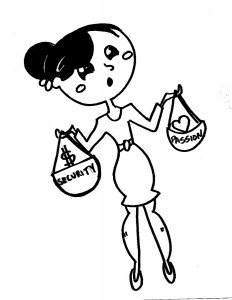Majors should not define who students are
Depending on whether your major is in the Viterbi School of Engineering or the School of Dramatic Arts, your answer could either elicit an impressed smile or a disapproving frown from someone asking “So what are you studying?”
With news stations reporting on the dismal post-undergraduate unemployment rate and studies by Forbes and TIME encouraging students to pursue fields in mathematics and engineering, it would seem that certain college majors are more lucrative — and perhaps “practical” — than others. A major in fine arts just doesn’t seem to hold the same weight as a major in computer science or civil engineering, and admitting that you’re majoring in philosophy can trigger a blank “and what do you plan to do with that?” expression.
It’s unsurprising, then, that with such a pressure to perform well, those with an interest in the arts and humanities might believe they face a disadvantage when it comes to the job market.
“Unless you go to a top-20 brand-name school, what matters most to employers is your major,” Katie Bardaro, lead economist at the compensation research firm PayScale, told Forbes on May 15.
That Forbes piece goes on to cite a report by Gen-Y research agency Millennial Branding that showed that “a full 69% of managers agreed that relevant coursework is important when considering job candidates.”
But that might not really be the case.
Despite what Forbes and TIME suggest, a student’s choice in major might be irrelevant. As the job market changes to accommodate technological advances, a student’s major holds less importance than his or her ability to perform certain skills that are often acquired outside of the classroom.
“Something that I tell students is that your major is just one piece of the whole marketability puzzle,” said Julie Tieu, a counselor working at the USC Career Center. “When employers are hiring, they are looking at all of your skill sets — not just your major. Your major can be helpful and let you know some of the academics [behind the field] and terminology, but it’s in no way the comprehensive training you’ll need.”
Admittedly, certain majors do have a lower unemployment rate than others, but often by negligible amounts. Recently, the Wall Street Journal used 2010 — a year right in the heart of the job crisis — census data and a study by the Georgetown University Center to compile a list of the most employable and well-paying college majors, but majors in the humanities weren’t far behind their scientific counterparts.
A major in history, for example, had an unemployment rate of 6.5 percent while a degree in biology averaged 5.6 percent. For a student who has a passion for the past, that difference of 0.9 percent might appear insignificant.
In some cases within that same Wall Street Journal study, majors in the humanities had a lower unemployment rate than a science-or-math-related degree. The unemployment rate for a French major, for example, was 5.9 percent, while the rate for computer engineering was 7 percent — an unexpected statistic, but welcome news for the student who just returned from studying abroad in Paris with no idea of where to pick up his or her studies.
But these statistics beg the question: Is that French major really using her degree?
“The major is not the only thing that will determine where your career will go,” Tieu said. “There are so many people who majored in one thing and did something different. And it’s not because they couldn’t find a job [in that field]. It’s because they were able to find a different job that allowed them to use those skills in a different work setting.”
Tieu often tells students who visit her in the counseling center about two of her friends who used their majors in unconventional ways. One of her friends majored in psychology before beginning a career in accounting. Another studied Russian literature before accepting a job as a web developer.
“It always goes back to what you want to do,” Tieu said. “What are your skills? What are your strengths?”
Another thing to consider is the level of happiness that accompanies the field of work you intend to pursue, even if that degree in nuclear engineering flaunts a 75th-percentile salary of $138,000.
Note, for instance, that Forbes listed a career as an author as fourth on its list of the “Ten Happiest Jobs.” Though a degree in English has an unemployment rate of 6.7 percent and a 75th percentile salary of $75,000, this didn’t seem to counteract the happiness bibliophiles and writers experience on the job.
Plus, opting for a versatile major, such as narrative studies or English, can provide opportunities to travel and teach in foreign countries, such as Thailand and Italy, in programs like Fulbright and LanguageCorps. For those interested in a more unconventional career path, taking the time to truly explore undergraduate study through such options might not be such a bad idea.
Still, for sharpening that competitive edge, Tieu considers volunteer experience, internships, participation in student organizations and an ability to communicate well with others as significant ways for students to improve their marketability.
“Employers like to see that you have something else outside of your major anyway,” said Tieu. “If you have a resume and you don’t have anything else on there but your major, then what does that say?”
All things considered, students shouldn’t be afraid to major in what they love even if they might face greater difficulty in finding a job. With new statistics coming in from so many different directions, it’s important to remember that your major doesn’t define you or your net worth.
Only you do.
Carrie Ruth Moore is a sophomore majoring in English.

